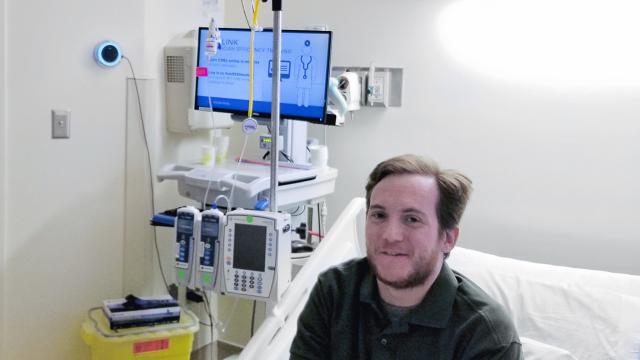While it’s hard not to roll your eyes at voice assistants getting added to every single thing in the smart home, a Los Angeles hospital is actually putting Amazon Alexa to good use. About 100 patient rooms at Cedars-Sinai will now be equipped with Amazon Echos to help patients and caregivers interact more efficiently.
The pilot program runs off an Alexa-powered platform called Aiva. Now, patients can easily say things like, “Alexa, change the channel” or “Alexa, tell my nurse I need to use the restroom.” Some requests, like turning a TV on or off, Alexa can handle on its own. Others will be sent directly to a caregiver’s mobile phone. And, probably the most helpful feature for healthcare providers is that the Aiva platform will be able to send requests to the appropriate type of caregiver.
So while a nurse would get any requests for painkillers, a clinical partner would get bathroom requests. According to Cedars-Sinai, requests that take a while to fulfil would then get bumped up the chain of command.
On top of the medical features, patients also get access to all the typical Alexa features like weather, music, and sports scores. And while this is all well and good at home, these features would be way more useful in a hospital setting. Hospitals can be a miserable place for many patients, especially if their mobility is negatively impacted. So say you’re a lonely patient trying to kill some time, you could definitely pass the time trolling your illness saying something like, “Alexa, I’m in agony. Play ‘Despacito’ followed by ‘Suga Suga’ by Baby Bash.”
But in all seriousness, this is one of the instances where voice assistants can solve a problem, as opposed to making modern first-world living more convenient. In general, it’s a win-win situation where patients get some company and a hands-free way to contact caregivers, while hospital staff can avoid misdirected requests. “Whereas previously nurses were frequently asked to help with the in-room television, Alexa does that job for us, allowing nurses to focus on providing the highest level of patient care,” said Golda Morales, an assistant nurse manager at Cedars-Sinai in a statement.
While this might raise concerns about automation stealing jobs from qualified healthcare professionals, I’d argue it actually does the opposite. It does play into automation’s narrative of efficiency, but you’re essentially helping out overworked nurses at already understaffed hospitals.
Arguably, if you’re a qualified nurse, the last thing you want to spend your time doing is changing TV channels when a patient elsewhere might be in need of painkillers. Plus, there’s just no way Alexa’s ever going to be able to take your blood samples even if you ask it nicely.
Another concern with the whole voice-assistant setup, however, is privacy. Aiva’s privacy policy page says it does collect voice requests that patients or caregivers make using voice assistants. That might include sensitive health information if they’re included in the request itself. It also collects info about a caregiver’s role and responsibilities—like name, schedule, and contact information. All of this makes sense for the service to work, but what’s concerning is the lack of details on how this information is anonymized.
Aiva says it “de-identifies” any information that’s collected, and says it doesn’t use names or patient ID numbers. It also says it encrypts the data “in transit and storage,” but that Aiva may “retain de-identified information indefinitely.”
Still, even with measures like encryption in place, there’s little information on how bulletproof the system’s entire security actually is. Human error sometimes plays a major role in data leaks, and health data requires a higher degree of privacy than say, your godawful music listening history. After all, a recent Amazon user in Germany accidentally got access to over a thousand audio recordings of a complete stranger.
Cedars-Sinai isn’t the only hospital experimenting with voice assistants. Boston Children’s Hospital has also used voice assistants to dictate clinical notes, and provide voice-guided walkthroughs for cleaning catheters, collecting specimens, or providing hands-free checklists to physicians in real time.
[Cedars-Sinai via Engadget]
